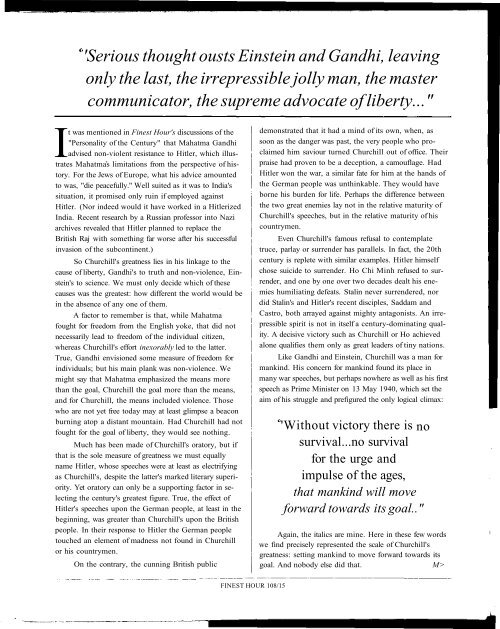journal of the churchill center and societies - Winston Churchill
journal of the churchill center and societies - Winston Churchill
journal of the churchill center and societies - Winston Churchill
- No tags were found...
Create successful ePaper yourself
Turn your PDF publications into a flip-book with our unique Google optimized e-Paper software.
'Serious thought ousts Einstein <strong>and</strong> G<strong>and</strong>hi, leaving<br />
only <strong>the</strong> last, <strong>the</strong> irrepressible jolly man, <strong>the</strong> master<br />
communicator, <strong>the</strong> supreme advocate <strong>of</strong> liberty..."<br />
It was mentioned in Finest Hour's discussions <strong>of</strong> <strong>the</strong><br />
"Personality <strong>of</strong> <strong>the</strong> Century" that Mahatma G<strong>and</strong>hi<br />
advised non-violent resistance to Hitler, which illustrates<br />
Mahatmas limitations from <strong>the</strong> perspective <strong>of</strong> history.<br />
For <strong>the</strong> Jews <strong>of</strong> Europe, what his advice amounted<br />
to was, "die peacefully." Well suited as it was to India's<br />
situation, it promised only ruin if employed against<br />
Hitler. (Nor indeed would it have worked in a Hitlerized<br />
India. Recent research by a Russian pr<strong>of</strong>essor into Nazi<br />
archives revealed that Hitler planned to replace <strong>the</strong><br />
British Raj with something far worse after his successful<br />
invasion <strong>of</strong> <strong>the</strong> subcontinent.)<br />
So <strong>Churchill</strong>'s greatness lies in his linkage to <strong>the</strong><br />
cause <strong>of</strong> liberty, G<strong>and</strong>hi's to truth <strong>and</strong> non-violence, Einstein's<br />
to science. We must only decide which <strong>of</strong> <strong>the</strong>se<br />
causes was <strong>the</strong> greatest: how different <strong>the</strong> world would be<br />
in <strong>the</strong> absence <strong>of</strong> any one <strong>of</strong> <strong>the</strong>m.<br />
A factor to remember is that, while Mahatma<br />
fought for freedom from <strong>the</strong> English yoke, that did not<br />
necessarily lead to freedom <strong>of</strong> <strong>the</strong> individual citizen,<br />
whereas <strong>Churchill</strong>'s effort inexorably led to <strong>the</strong> latter.<br />
True, G<strong>and</strong>hi envisioned some measure <strong>of</strong> freedom for<br />
individuals; but his main plank was non-violence. We<br />
might say that Mahatma emphasized <strong>the</strong> means more<br />
than <strong>the</strong> goal, <strong>Churchill</strong> <strong>the</strong> goal more than <strong>the</strong> means,<br />
<strong>and</strong> for <strong>Churchill</strong>, <strong>the</strong> means included violence. Those<br />
who are not yet free today may at least glimpse a beacon<br />
burning atop a distant mountain. Had <strong>Churchill</strong> had not<br />
fought for <strong>the</strong> goal <strong>of</strong> liberty, <strong>the</strong>y would see nothing.<br />
Much has been made <strong>of</strong> <strong>Churchill</strong>'s oratory, but if<br />
that is <strong>the</strong> sole measure <strong>of</strong> greatness we must equally<br />
name Hitler, whose speeches were at least as electrifying<br />
as <strong>Churchill</strong>'s, despite <strong>the</strong> latter's marked literary superiority.<br />
Yet oratory can only be a supporting factor in selecting<br />
<strong>the</strong> century's greatest figure. True, <strong>the</strong> effect <strong>of</strong><br />
Hitler's speeches upon <strong>the</strong> German people, at least in <strong>the</strong><br />
beginning, was greater than <strong>Churchill</strong>'s upon <strong>the</strong> British<br />
people. In <strong>the</strong>ir response to Hitler <strong>the</strong> German people<br />
touched an element <strong>of</strong> madness not found in <strong>Churchill</strong><br />
or his countrymen.<br />
On <strong>the</strong> contrary, <strong>the</strong> cunning British public<br />
demonstrated that it had a mind <strong>of</strong> its own, when, as<br />
soon as <strong>the</strong> danger was past, <strong>the</strong> very people who proclaimed<br />
him saviour turned <strong>Churchill</strong> out <strong>of</strong> <strong>of</strong>fice. Their<br />
praise had proven to be a deception, a camouflage. Had<br />
Hitler won <strong>the</strong> war, a similar fate for him at <strong>the</strong> h<strong>and</strong>s <strong>of</strong><br />
<strong>the</strong> German people was unthinkable. They would have<br />
borne his burden for life. Perhaps <strong>the</strong> difference between<br />
<strong>the</strong> two great enemies lay not in <strong>the</strong> relative maturity <strong>of</strong><br />
<strong>Churchill</strong>'s speeches, but in <strong>the</strong> relative maturity <strong>of</strong> his<br />
countrymen.<br />
Even <strong>Churchill</strong>'s famous refusal to contemplate<br />
truce, parlay or surrender has parallels. In fact, <strong>the</strong> 20th<br />
century is replete with similar examples. Hitler himself<br />
chose suicide to surrender. Ho Chi Minh refused to surrender,<br />
<strong>and</strong> one by one over two decades dealt his enemies<br />
humiliating defeats. Stalin never surrendered, nor<br />
did Stalin's <strong>and</strong> Hitler's recent disciples, Saddam <strong>and</strong><br />
Castro, both arrayed against mighty antagonists. An irrepressible<br />
spirit is not in itself a century-dominating quality.<br />
A decisive victory such as <strong>Churchill</strong> or Ho achieved<br />
alone qualifies <strong>the</strong>m only as great leaders <strong>of</strong> tiny nations.<br />
Like G<strong>and</strong>hi <strong>and</strong> Einstein, <strong>Churchill</strong> was a man for<br />
mankind. His concern for mankind found its place in<br />
many war speeches, but perhaps nowhere as well as his first<br />
speech as Prime Minister on 13 May 1940, which set <strong>the</strong><br />
aim <strong>of</strong> his struggle <strong>and</strong> prefigured <strong>the</strong> only logical climax:<br />
'Without victory <strong>the</strong>re is no<br />
survival...no survival<br />
for <strong>the</strong> urge <strong>and</strong><br />
impulse <strong>of</strong> <strong>the</strong> ages,<br />
that mankind will move<br />
forward towards its goal.."<br />
Again, <strong>the</strong> italics are mine. Here in <strong>the</strong>se few words<br />
we find precisely represented <strong>the</strong> scale <strong>of</strong> <strong>Churchill</strong>'s<br />
greatness: setting mankind to move forward towards its<br />
goal. And nobody else did that. M><br />
FINEST HOUR 108/15

















